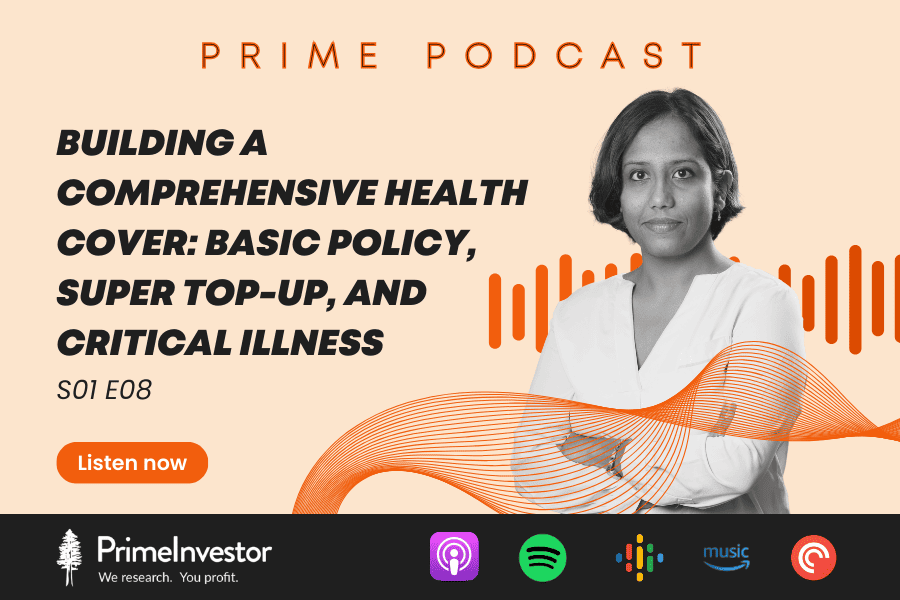Listen to this episode on your favorite podcast app :
What is this episode about?
In this eighth podcast episode, hosts Pavithra Jaivant and Bhavana Acharya discuss the essential components of building a comprehensive health insurance cover, emphasizing the importance of personal health insurance, even if one’s employer provides coverage. They break down the 3 key components: a basic health insurance policy, a super top-up policy, and a critical illness plan.
- Basic health insurance policy:
- This is the foundation of your health coverage.
- It covers hospitalization expenses due to illness, injury, or medical procedures.
- Consider family floater policies for cost-effectiveness.
- Key factors to consider: restrictions, waiting periods, room rent coverage, cashless hospital networks, and customer experiences.
- Super top-up policy:
- A super top-up policy complements the basic health insurance policy.
- It pays out after a deductible amount is reached.
- The deductible can be equal to the sum insured of your basic policy.
- It’s a cost-effective way to increase your health coverage.
- Critical Illness Plan:
- Critical illness plans provide a lump-sum payout on diagnosis of specific severe illnesses.
- Survival period conditions may apply.
- There are limits on the number of claims, with some plans categorizing illnesses.
- A critical illness cover can serve as a financial safety net for unexpected medical expenses.
In this podcast, the hosts also cover whether you need to take out separate health insurance if you’re already covered by your employer, a rough guide on how much you need in terms of overall health coverage and an idea of how much all this may cost you.
In conclusion, building a comprehensive health insurance cover involves combining a basic health insurance policy, a super top-up policy, and a critical illness plan. These components work together to provide financial protection against various health-related risks. It’s crucial to assess your specific needs, consider your age and potential health risks, and align your coverage accordingly. Additionally, maintaining an emergency fund can offer additional financial security for unexpected medical expenses.

Key segments in the podcast discussion
- Market updates (0:32 – 6:20)
- Zerodha AMC & Groww Mutual Fund (6:21 – 8:36)
- GDP growth (8:37 – 11:19)
- Corporate Buzz: TCS’s $1 billion deal and ITC’s investments (11:20 – 13:30)
- Health Insurance Essentials (13:31 – 16:45)
- Policy Features: Check crucial elements when choosing the right health policy (16:46 – 21:44)
- Super Top-up Insights (21:45 – 24:49)
- Critical Illness Covers: Protect yourself with critical illness coverage (24:50 – 27:50)
- Other Insurance Tips (27:51 – 36:03)
Don’t have a podcast app? Listen to the full episode here :
Follow the podcast wherever you listen to podcasts :




3 thoughts on “Podcast : Building a Comprehensive Health Cover – Basic Policy, Super Top-Up, and Critical Illness”
Thank you for the interesting topic. Some points that require clarification:
(a) Does the critical illness cover (CIC) come with a family floater type option? If not, is it cheaper to opt CIC as a rider/add-on cover in the basic floater policy or opt for each family member a separate CIC?
(b) Can you elaborate on the concept of IRDAI mandated (?) moratorium period of eight years beyond which a claim cannot be rejected? How true is this regulation by IRDAI? If true, any data on how much the insurance providers respect this regulation? Does the moratorium period reset if the policy is ported before and after eight years?
(c) Is it possible to use one of the prime portfolios (or a fresh one) as an emergency health portfolio?
(d) This is not a query but a opinion: After 28:52, you suggest that insuring oneself at a young age is better because of the possibility that company may deny policy or add a loading to premium, as one gets old with lifestyle diseases. Though I understand and agree with the spirit with which you suggest this, my opinion is that, unlike term insurance the health policy premium is not fixed and increases as one grows old (age slab-wise)—irrespective of the number of years the policy has been in force and with no claims. Thus, entering a health policy near middle-age (40-45+) or running it from a young age (20-25+) seems (almost) same from the premium point of view, for a reasonably healthy young adult with no PED, ignoring NCB, moratorium period etc.
Thanks in advance.
Thanks!
a) Multiple people can be added in a critical illness cover, however, note that since this is a defined benefit policy, there is no floating cover. We believe a standalone critical illness policy offers more broader coverage (of critical illnesses). The maximum cover offered by a standalone critical illness policy can be higher than what an add-on to basic health policy offers, which is usually linked to the sum insured of the basic policy.
b) The IRDAI guidelines implies that starting 1st Apr 2021, for policies for which premiums have been paid for continuous 8 years, no claims can be contested except for fraudulent claims and exclusions. According to the guidelines, porting of policy doesn’t make it ineligible for the moratorium period. Since this is a relatively recent development, we are yet to find more details on the impact of this.
c) You don’t need to create a separate emergency portfolio for health alone. What we mentioned in the podcast was that you can use an emergency portfolio that you would have created to meet medical expenses as well. We have a readymade emergency portfolio here, or you can use your own mix of liquid/very short term funds + FDs from Prime Funds & Prime Deposits.
d) You are correct, a health insurance policy does not allow any advantage in premium for buying it early in life as premium gets revised upwards with age. It is also true that for a healthy individual, entering a policy at middle age is likely to cause a similar yearly premium outgo as if he/she was renewing it from the 20s; However, since insurance is about preparing for the unexpected, we believe it’s better not to delay too much and risk developing a high-cost medical condition that might render one ineligible for insurance.
Thank you for the detailed response. It helps a lot.
Comments are closed.